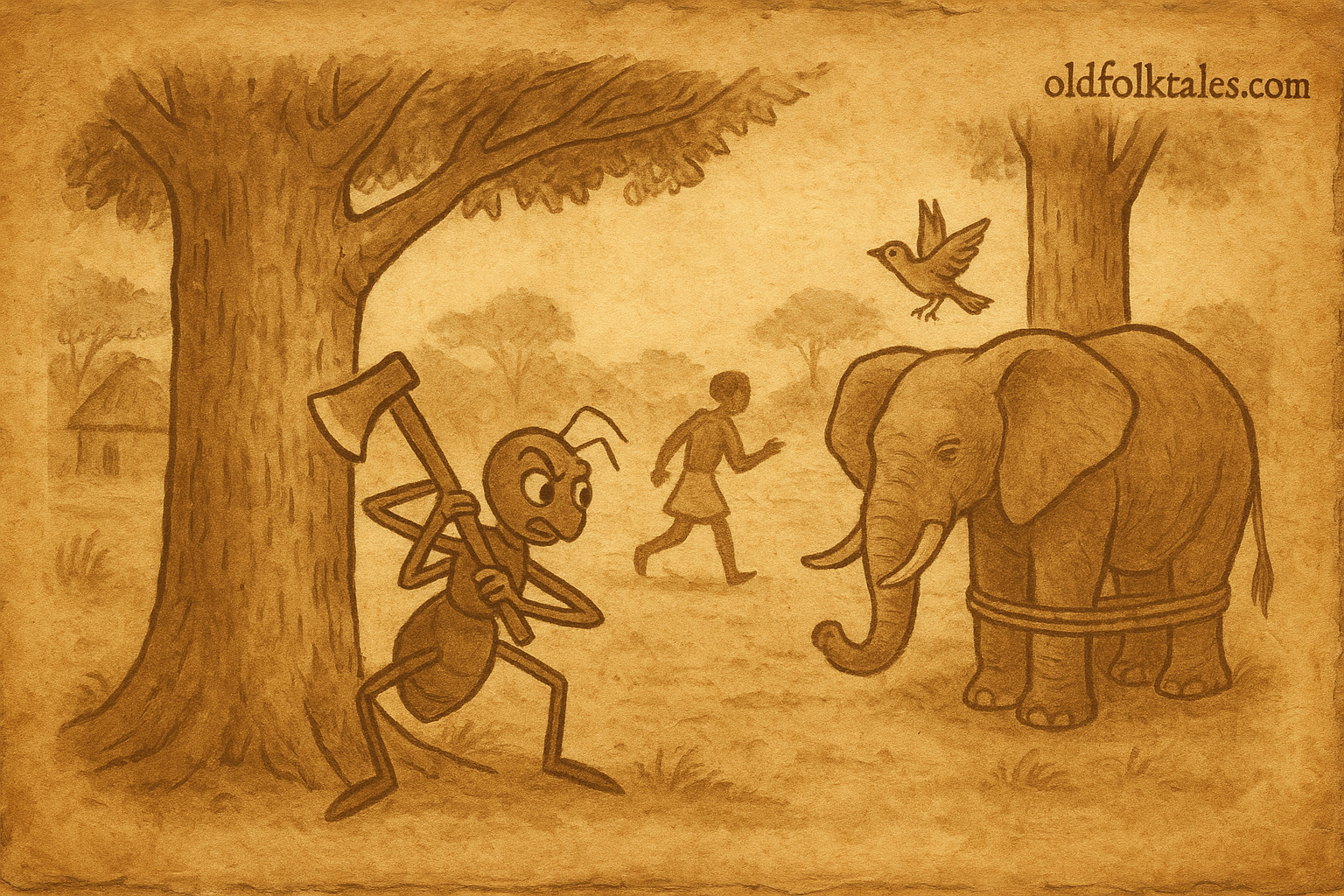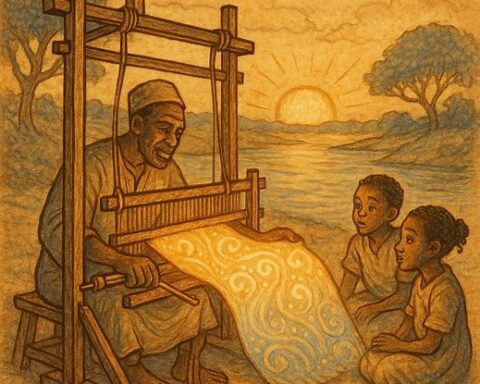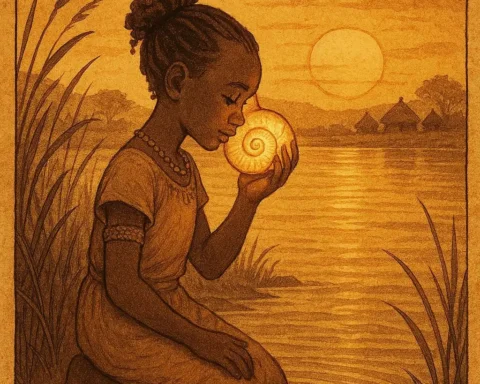Long ago in the land of the Wolof people of Senegal, there stood a tree so vast that it seemed to touch the very sky. Its trunk was thicker than a house, and its branches spread out in every direction, blocking the sun. For many years this tree cast a heavy shadow upon the village. Nothing grew around it, for the earth beneath its shade remained cold and lifeless. Farmers complained that their crops withered and children shivered without warmth. The people gathered again and again to discuss the problem, but no one could imagine how to bring down such a monstrous tree.
At last the villagers carried their concerns to the King. He was a wise man, respected by all, and he sat upon his carved wooden throne to hear their cries. After a long silence, he rose and declared before the assembly, “This tree must be cut down. Let it be known to every man and woman that whoever succeeds in cutting it down with nothing more than a wooden axe will be rewarded with a living elephant.”
Gasps and murmurs filled the crowd. An elephant was no ordinary reward. It was a creature of great power and majesty, a sign of wealth, honor, and prestige. To own such an animal would bring respect and fortune to any household. But though the prize was beyond imagination, the task seemed impossible. The tree looked as if it had been standing since the beginning of time.
Among the crowd was Spider, the trickster whose wit was known in every corner of the land. He rubbed his hands together and whispered to himself, “This challenge was made for me. Others see an obstacle, but I see an opportunity.” He licked his lips and smiled with pride, already dreaming of leading an elephant through the streets, while all eyes followed him.
The next day Spider appeared before the King. He bowed low, spreading his many legs upon the ground. “Great King,” he said, “I am the one who will bring down this tree with the wooden axe.”
The King studied him carefully. He doubted that such a small creature could succeed, yet the challenge had been declared and the rules were clear. He ordered that Spider be given the axe.
Spider marched to the base of the towering tree. A circle of villagers gathered to watch, whispering that it was surely impossible. Spider lifted the axe high, its wooden handle polished by many hands, and struck the trunk with all his strength. To the astonishment of all, the tree groaned, cracked, and began to split. With every swing Spider’s strokes rang louder, until the earth trembled beneath their feet. Then, with a crash that shook the sky, the mighty tree toppled and fell to the ground.
A cloud of dust rose and covered the village. When it cleared, the tree lay broken, and the sun poured through the empty space where its branches had stood. Crops would grow again, and warmth would return to the land. The people erupted in cheers. Spider, who had done the impossible, stood tall with pride.
The King, bound by his promise, ordered that a great elephant be given to Spider. It was enormous, with tusks that gleamed white as ivory and skin as strong as leather. Spider swelled with joy. He strutted through the village leading the elephant, smiling at the envious stares of men, women, and children alike. At last he was not only clever but also the richest and most admired among them.
Yet Spider’s greed was not satisfied. On his way home he came upon a small bird, a wren, perched upon a branch and singing a sweet tune. The wren tilted its head and called to him, “Good day, Spider. What a fine prize you have there. But tell me, is that elephant not too heavy a burden for you?”
Spider laughed proudly. “This is the greatest prize in all the land. None can match me now.”
The wren continued, “Think again, my friend. The elephant is large and slow. It will eat more than you can provide. You will spend your days feeding it and your nights guarding it. But I am small, light, and quick. I can bring you joy with my song and freedom with my flight. Why not trade the elephant for me?”
At first Spider shook his head. “What foolishness. How can a wren compare to an elephant?” But the bird’s voice was smooth and convincing. Spider’s pride began to whisper within him that perhaps there was wisdom in the bird’s words. The more he thought of the cost of feeding the elephant, the more he believed the wren. Finally, in his greed and foolish pride, Spider agreed to the trade.
The wren hopped onto his shoulder, chirped once, and then flew high into the sky. Spider waited for it to return, but the bird disappeared into the distance, leaving him alone. The elephant was gone, and all he had left was empty air.
The villagers, who had followed the scene, burst into laughter. They clapped their hands and shook their heads. “Spider,” they cried, “you have lost an elephant for the sake of a wren.”
From that day, among the Wolof people, the saying remained: only a fool gives away greatness for nothing.
Moral Lesson of To Lose an Elephant for the Sake of a Wren
The Wolof folktale of Spider shows how greed and pride can cloud judgment. Spider’s cleverness earned him a mighty reward, but he let vanity and foolish desire lead him to a worthless trade. The story reminds us to value true blessings and not to let pride trick us into losing them.
Knowledge Check
What is the central lesson of the Wolof folktale To Lose an Elephant for the Sake of a Wren?
The story teaches that greed and pride can cause people to lose valuable rewards by chasing worthless things.Why did the King promise an elephant in the folktale To Lose an Elephant for the Sake of a Wren?
The King wanted the impossible tree removed, so he offered an elephant as a reward for whoever could cut it down.How did Spider succeed in cutting down the tree in To Lose an Elephant for the Sake of a Wren?
Spider used a wooden axe, and through persistence and cleverness, he brought the great tree crashing to the ground.Why did Spider trade the elephant in the Wolof folktale To Lose an Elephant for the Sake of a Wren?
He was deceived by the wren’s persuasive words and believed that the bird would be easier to keep and more useful than the elephant.What reaction did the villagers have in To Lose an Elephant for the Sake of a Wren?
They laughed at Spider, mocking him for foolishly trading something of great value for nothing.What cultural origin does the folktale To Lose an Elephant for the Sake of a Wren belong to?
It comes from the Wolof people of Senegal in West Africa.Cultural Origin: Wolof Folktale, Senegal






